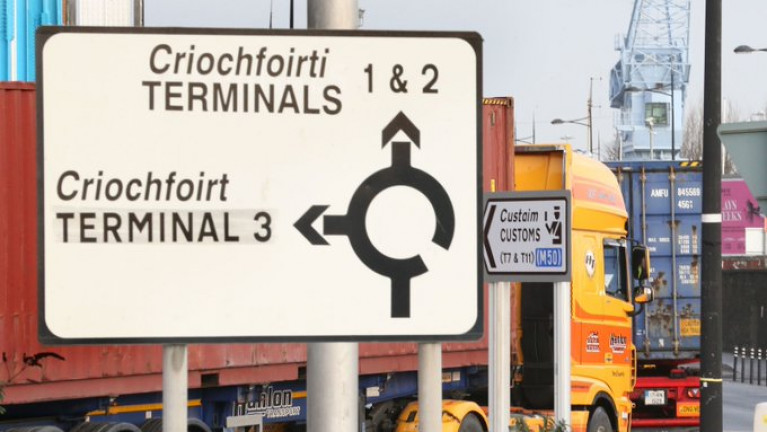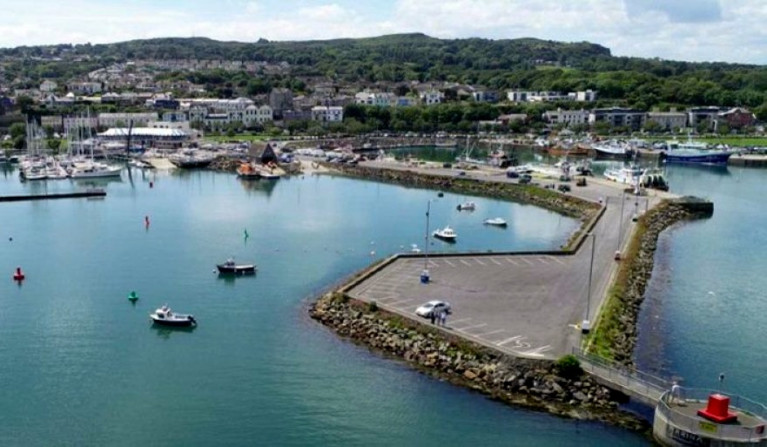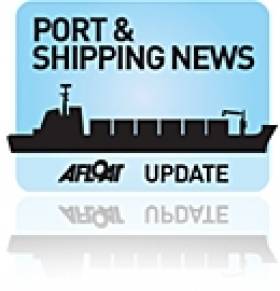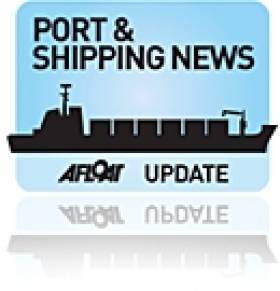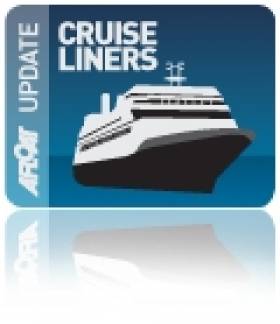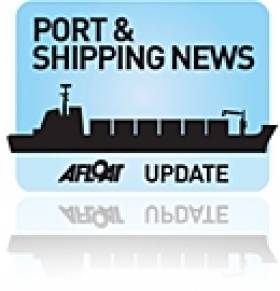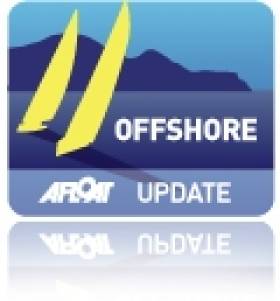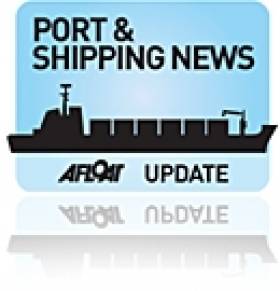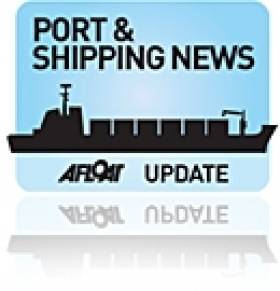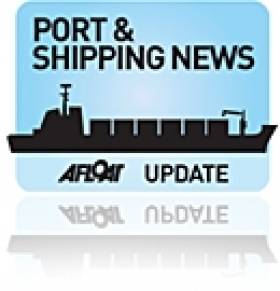Displaying items by tag: Ports
Irish Ports & Airports in Breach of WHO Pandemic Rules
In documents seen by RTÉ News, Ireland is in breach of the World Health Organization's International Health Regulations (IHR) on contagious disease control by failing to designate a 'competent authority' at its ports and airports.
The documents also show that Ireland has been non-compliant for approximately a decade, despite high-level discussions on the issue between the Health Service Executive, Department of Health and Department of Transport.
Under the IHR a 'competent authority' at points of entry must be designated to monitor the risk of dangerous contagious diseases entering the State.
Ireland has no such designated competent authority points of entry to the country.
Ireland reported substantial compliance in most other areas of the IHR, which were updated in 2005 to improve international pandemic preparedness in the wake of the 2002-4 SARS epidemic.
In a statement, the Department of Health said that the non-compliance with the IHR does not affect Ireland’s pandemic response at ports and airports in any practical way. The statement said that checks are carried out by health officers under existing domestic law and other regulations.
In the records, released under Freedom of Information, senior HSE staff expressed concern that the failure to designate a competent authority at points of entry was also a breach of EU cross-border regulations, which require IHR compliance.
In a document dated January 2020, Dr John Cuddihy, the Health Surveillance Protection Centre’s interim director, reported that no competent authority existed at Dublin, Cork and Shannon airports.
The ports of Dublin, Cork, Rosslare, (incl. ferry operations) along with Limerick and Waterford also recorded no designated competent authority.
RTE has much more here on this story.
Marine Minister McConalogue Opens up More Ports to Irish Fishing Vessels on British Register
Minister for Marine Charlie McConalogue has come to the rescue of Donegal islanders with fishing boats registered in Northern Ireland who were blocked from landing into their nearest port by the Brexit deal.
Northern Irish vessels and boats owned by fishermen in the Republic which are on the British register were informed that they could only land into two designated ports - Killybegs, Co Donegal and Castletownbere, Co Cork – after January 1st.
The State’s Sea Fisheries Protection Authority (SFPA) had recently initiated an investigation into “unauthorised” landings into Greencastle, Co Donegal.
However, Mr McConalogue says he has arranged for vessels on the British register to land into five additional ports - Greencastle, Burtonport and Rathmullan in Donegal, Ros-a-Mhíl in Galway and Howth in Co Dublin.
He said he was “ working to make sure the necessary notifications and requirements are in place to have these ports operational from Monday, February 1st”.
Under the new designations, Ros a Mhíl and Howth will be able to accommodate landings of demersal (whitefish) catch from vessels under 24 metres, Monday to Friday from 10 am to 10 pm.
Greencastle, Rathmullen and Burtonport will be designated for non-quota species landings from vessels under 18 metres and will operate from 2 pm to 8 pm from Monday to Friday, he said.
These designated hours are due to the need for oversight by the SFPA, he said.
He described it as “an important decision which will allow fishers in small vessels to continue their livelihoods in a safe manner”.
“Following Brexit, it is important now more than ever, to support our fishers and fishing communities and to do all we can do help them continue their livelihoods,” Mr McConalgoue said.
He said that any UK Northern Ireland registered boats landing into any of the seven Irish ports will have to comply with additional documentary and more procedural requirements than before Brexit.
The SFPA had confirmed last week in response to queries about its investigations that UK registered fishing vessels, including those vessels which are registered to addresses in Northern Ireland, are subject to new EU fisheries and food safety controls”.
These “reflect the UK’s status now as a third country,” the SFPA said.
It confirmed Killybegs and Castletownbere as the only two ports allowed to continue to receive landings under two separate designations - the Illegal, Illegal, Unreported, Unregulated – Third Country (IUU-TC) designation and North East Atlantic Fisheries Commission (NEAFC) regulations.
The development prompted calls last week by a Northern Irish fish industry executive for “Dublin to reciprocate” an arrangement where all seven Northern Irish ports are still open to vessels on the Republic’s register.
The west Cork vessel Rachel Jay was first Irish vessel since the Brexit regulations came into force to land into Lisahally in Derry with mackerel caught off the Scottish coast.
Alan McCulla of the Anglo North Irish Fish Producers’ Organisation said that while he welcomed the Rachel Jay and other Irish landings, he questioned why “when Belfast saw this coming, Dublin did not”.
“The Northern Irish authorities were able to take measures to keep our ports open to Irish vessels, “he said, adding that “the EU still rules Ireland’s waves”.
Under legislation which was controversially amended in 2019, Northern Irish vessels can fish within the Republic’s six-mile limit – but the legislation does not provide for landing.
The Sea Fisheries Amendment Act 2019 formalised in law a “voisinage” agreement which had existed between the Republic and Northern Ireland since the 1960s, and which was challenged by Greencastle fisherman Gerard Kelly.
Ireland's Maritime Strategy 'A Model To Follow' For Malta
#Maritime - Is Ireland a model to follow when it comes to maritime strategy?
It is according to Simon Mercieca of the University of Malta, who blogs on the Malta Independent website about the need for his country to take lessons from the Irish experience.
Citing his visit to a maritime history conference at University College Cork late last year, Dr Mercieca is full of praise for Marine Minister Simon Coveney and his department's focus on revitalising Ireland's ports and coastal areas.
That stands in stark contrast to the situation on Malta as Dr Mercieca would have it, describing a country where maritime "is today a non-entity in our political discussion".
"Despite the fact that Malta built its fortune on its geographical position in the middle of the Mediterranean Sea, the country now lacks a serious maritime vision."
The Malta Independent has more on the story HERE.
#ports – The Cabinet has approved the draft General Scheme of a new Bill with important implications for Ireland's vital port sector, Minister for Transport, Tourism & Sport Leo Varadkar has announced. The Harbours (Amendment) Bill 2014 will allow the five designated Ports of Regional Significance in Drogheda, Dún Laoghaire, Galway, New Ross and Wicklow to transfer to local authority ownership at a future date, in line with Government policy to strengthen local government.
These five ports play an important role through tourism, leisure amenity, and regional trade. The Government has decided that their future is best secured under strong local governance.
The draft legislation builds upon Minister Varadkar's ongoing reform of the State commercial ports sector as announced in last year's new National Ports Policy.
"This is an important Bill for the ports sector, which plays a major role in the Irish economy. The National Ports Policy encourages each port, whether small or large, to develop its full potential to ensure that they can all contribute to further growth in the ports sector. Transferring the five regional ports to local authority management at a future date will be the best way to protect their future and ensure good governance," Minister Varadkar said.
Sea-borne freight through Ireland's ports sector accounts for 84% of Ireland's trade in volume and 62% in value terms. Many of Ireland's major exporting sectors such as pharmaceuticals, chemicals and food rely heavily on sea transport.
The Bill will also introduce higher standards for appointments to the boards at Ireland's largest port companies at Dublin, Cork, Shannon Foynes and Waterford. It will set out specific skillsets for potential appointees, introduce term limits and make it a legal requirement for Chairmen-designate to appear before the relevant Oireachtas committee prior to their appointment. This is already a non-statutory Government requirement.
The draft Bill will now be sent to the Joint Oireachtas Committee on Transport & Communications for detailed consideration by all its members.
Details of draft Bill
The main purpose of the Bill is to provide the necessary amendments to allow for a later transfer of the five designated Ports of Regional Significance - Drogheda, Dún Laoghaire, Galway, New Ross and Wicklow - to local authority ownership
The Bill provides for flexibility in the form of the actual transfer, which may be a transfer of Ministerial shareholding in the existing company, or a dissolution of the company structure and full integration within local authority structures.
The second major theme of the Bill is to further improve the board selection and appointment process to the Ports of National Significance at Dublin, Cork, Shannon Foynes and Waterford such as by specifying certain required skillsets, introducing term limits and requiring Chairpersons designate appear before the relevant Oireachtas committee prior to appointment.
Cruise Industry Body To Discuss Funding Changes
#Cruises - Cruise Ireland's members will meet in January to discuss controversial proposals to change the way the organisation is funded.
At November's board meeting of the industry body representing interests in the Irish cruise industry, the Port of Cork's commercial manager Michael McCarthy charged that Ireland's biggest ports in Dublin and Cork should no longer be Cruise Ireland's primary funders.
McCarthy cited the wish for greater contributions from other tourist venues that reap the biggest business from Ireland's cruise traffic.
Echoing his sentiments, Cruise Ireland chair Eamonn O'Reilly noted that the body's current subscription model of 'the bigger you are, the more you pay' was no longer tenable in an increasingly competitive cruise marketplace - in light of plans by Dun Laoghaire, among other ports, to attract cruise liners.
O'Reilly, who is chief executive of the Dublin Port Company, proposed of a flat membership fee of €10,000 - which was objected to by a number of those present.
And though the matter was deferred for further discussion in the New Year, O'Relly shared Dublin Port's position that it would not not commit to funding Cruise Ireland under the current model beyond 2014.
Other matters discussed at November's meeting included a review of Cruise Ireland's marketing strategy at important international trade shows, in order to more effectively sell Ireland as a key European cruise destination.
Cruise Ireland's next meeting will take place on 21 January 2014.
#ports – The Competition Authority has today published a study of competition in the ports sector in Ireland which found competition in port services could be improved. The study was commissioned by Minister for Jobs, Enterprise and Innovation, Richard Bruton, TD, as part of the Action Plan for Jobs 2012. The study looks at how competition is working between ports and within individual ports in Ireland.
The key findings of the study are:
The characteristics of the ports sector in Ireland mean that competition between ports is always going to be limited - principally for historical and geographical reasons.
Making sure that competition within a port is working well for each service provided within a port is therefore especially important.
The leasing and licensing arrangements for Lo-Lo (load on-load off) terminal operators in Dublin Port are too long and appear to restrict competition.
The current licensing arrangements for stevedore services in Dublin Port also appear to restrict competition.
More data collection and performance measures are needed for effective oversight of the ports sector.
As an island, Ireland is heavily dependent on its ports. Exports have been Ireland's only net contributor to economic growth in recent years. So ensuring that competition is working as well as it can and increasing Ireland's ability to trade internationally is vital. The Authority has made six recommendations aimed at improving competition in the ports sector.
Recommendation 1 – Leasing and licensing of Dublin Lo-Lo terminals: The way that leasing and licensing of Dublin Lo-Lo terminals is managed should be changed to substantially reduce the duration of the leases (sometimes over 100 years) and to change the way in which licences are automatically renewed.
Recommendation 2 – Stevedore licensing: In Dublin Port, at least two new general stevedore licences should be issued. General stevedore licences should be granted to applicants on a fair, reasonable and non-discriminatory basis, or through a tendering process. General stevedore licences should not be automatically renewable. Ports should not require applicants to demonstrate that they will attract new business to the port. Self handling licences should be granted by Dublin Port Company on a fair, reasonable and non-discriminatory basis. Where stevedore services are provided exclusively by the port directly, this should be clearly justified by the port authorities in question.
Recommendation 3 – Port closure and amalgamation: Policy focus should be on preserving competition and ensuring larger ports are operating efficiently and competing with one another. While port closures may result in lower administrative costs, they are unlikely to enhance competition among ports. The Authority recommends that the Department of Transport, Tourism and Sport should be required to seek the views of the Authority on any proposed port mergers, or that ports with turnovers below the existing merger thresholds should be designated as a class of merger that must be notified to the Competition Authority regardless of whether it meets the merger thresholds.
Recommendation 4 – Management models: The Department of Transport, Tourism and Sport should ensure that effective competition within ports is a key objective for port authorities.
Recommendation 5 – Investment in port-related road and rail infrastructure: It is unlikely that future Government investment in port-related road and rail infrastructure could be justified purely on the grounds of improving competition, and therefore any decision to invest in infrastructure in this context should be carefully considered.
Recommendation 6 – Data collection and performance measures: Data collection and port performance measures are vital in order to analyse the level of competition within the sector and to guide future policy-making. However this study has highlighted a lack of both. The Department of Transport, Tourism and Sport should prioritise the development of performance measures and data collection for the main ports.
Commenting on the report, Minister for Jobs, Enterprise and Innovation, Richard Bruton TD said, "A strong export performance will be crucial to the recovery in the economy and jobs market we are working so hard to achieve. That is why providing better supports and a better environment for exporters is at the centre of our Action Plan for Jobs. As part of this drive, I asked the Competition Authority to carry out a study on how competition in our ports sector can be improved, in order to make it easier and cheaper for our exporters to do business. The report produced today is an excellent piece of work, and Government will study its recommendations in detail and take appropriate action. This will ensure that we continue to improve the environment for exporters and support the growth in jobs and the economy we need".
Minister for Transport, Tourism and Sport, Leo Varadkar TD said, "The Competition Authority report into the ports sector is a thorough report and it complements the National Ports Policy which I published earlier this year. When I was in opposition, I was critical of how reports commissioned by the government of the time were published and then left on a shelf. I am determined to ensure this does not happen under the current Government. My Department will now consider these recommendations in detail and within six months will reply to the Competition Authority with a 'reasoned response' stating in each case whether we accept or reject the individual recommendations and explaining why."
Isolde Goggin, Chairperson of the Competition Authority, said, "This is the first comprehensive study of competition in the Irish ports sector. It should therefore be of benefit to providers and users of ports services and transport policymakers generally. I believe that implementing these recommendations will help to improve competition in the ports sector which plays a hugely important role in contributing to Ireland's competitiveness and economic growth. They will help to improve economic and consumer welfare as Ireland continues its path to economic recovery."
The full report is available to download below as a PDF attachment.
The Competition Authority is the State body responsible for enforcing Irish and European competition law in Ireland. Our mission is to ensure that markets work well for Irish consumers, business and the economy.
The Competition Authority and the National Consumer Agency are to merge to create a new organisation with a dual mandate to protect consumers and enforce competition law. Both organisations continue to operate and perform their statutory functions until the merger is given effect.
Ireland-Bound Couple In Stormy Waters With US Harbour
#Offshore - A retired US couple bound for Ireland on their sailing yacht encountered a storm of a different kind when they sought safety from hurricane-force winds in the Port of New Bedford.
According to Massachusetts news site South Coast Today, Gary and Jodi Bratton last month attempted to drop anchor in the harbour, a federally designated anchoring area - but were blocked by New Bedford's Harbour Development Commission, who demanded they either anchor beyond the hurricane barrier or take a city mooring charged at $45 per night.
"The right of navigation comes with it the right to anchorage," said Gary Bratton, who was headed to Galway Bay with his wife. "We didn't feel like we were in a position to negotiate. We're in trouble. We're hurt."
But morning manager Bob Bouley defended the harbour's actions, noting that visiting boaters are being discouraged from anchoring in the area for safety reasons due to construction work around the port's south terminal.
New Bedford shows as a harbour of refuge on US federal charts, says local yachtsman Jeff Pontiff, who adds that the harbour company has had some difficulties reconciling this with the operation of its busy shipping port.
South Coast Today has more on the story HERE.
#MaritimeDay - Malta has recently hosted the 6th European Maritime Day, (see Afloat.ie's Water Rats), where a conference of experts from all maritime sectors from around Europe had gathered.
Delegates discussed how to promote the tourism industry and maintain its position not only as a sector for sustainable growth, but also as a means to help in the restoration of the wider economy and a key contributor to the EU's Blue Growth agenda.
The European Maritime Day was organised by the European Commission (DG for Maritime Affairs and Fisheries) in partnership with the Maltese Ministry for the Economy, Investment and Small Business, and the Maltese Ministry for Tourism.
The Marine Institute welcomed the speech made by Dinny McGinley's TD, Minister of State at the Department of Arts, Heritage and the Gaeltacht at the conference, where he said "In Ireland, our ocean is a national asset, supporting a diverse marine economy, with vast potential to tap into a €1,200 billion global marine market for seafood, tourism, oil and gas, marine renewable energy, and new applications for health, medicine and technology"
"Blue Growth is one of the priority areas in our Presidency programme and in particular the development of an Action Plan for the Atlantic Strategy, which will be launched in Galway later this week by Commissioner Damanaki. The Action Plan identifies a range of actions designed to deliver smart, sustainable and socially inclusive growth and jobs, included in the area of maritime and coastal tourism," he said.
Minister McGinley further highlighted the importance of The Integrated Marine Plan – Harnessing our Ocean Wealth, launched last year by the Irish Government. This Plan is providing momentum for growth in the marine area in Ireland. In particular he spoke of the projects including the development of the National Necklace of Lighthouses which is being organised by The Commissioners of Irish Lights and Fáilte Ireland.
The Minister also spoke of the projects including the Wild Atlantic Way – Ireland's first long distance driving route along the west coast covering 2,500 kilometre route and the Sail West project which was an INTERREG IVA cross boarder funded programme that has now been successfully implemented by Donegal County Council as lead partners.
Mrs Caroline Bocquel, Director of Corporate Services at the Marine Institute also chaired a workshop entitled "The EU Integrated Maritime Policy and human health and well-being: What's the connection?".
The workshop focused on the relationships between marine environmental health and human health. Speakers highlighted the need for a coordinated oceans and human health research programme in Europe, addressing real public health challenges associated with our interactions with the seas presented in the context of the EU Integrated Maritime Policy.
The European Maritime Day is an annual event celebrated on the 20th May since 2008. It was established jointly by the European Council, the European Parliament and European Commission as part of the EU's Integrated Maritime Policy, which was launched in 2007.
The conference event is organised in a different European country each year where it aims to highlight the crucial role that oceans and seas play in the everyday life of all EU citizens.
Countries that have hosted this event include Brussels 2008, Rome 2009, Gijon 2010, Gdansk 2011, and Gothenburg 2012.
Irish Ports and Shipping Volumes Report Modest Uplift in 2012
The volume of cargo shipped though our ports saw a small overall increase last year with two of the five principle cargo segments experiencing growth. This is according to the latest annual edition of the 10th Annual Irish Maritime Transport Economist. This year's publication also included the launch of the IMDO's inaugural iShip Index* which was released at an industry briefing in Dublin, today (April 24th) by the Irish Maritime Development Office (IMDO). The new iShip Index is a quarterly weighted indicator which gauges the health of the Irish shipping industry and the wider economy. The iShip Index showed a one per cent1% increase in overall shipping activity across the State during 2012.
Speaking at the launch of the 10th publication, IMDO Director Mr. Glenn Murphy said, "Over the past decade Irish ports have handled just under half of a billion tonnes of cargo, while more than 27 million container and trailer units passed through ports on the Island of Ireland. During this time, we have seen the highest volume rises followed by record declines. Our publication clearly illustrates the relationship between the maritime economy and the real Irish economy. While not an absolute indicator in its own right, the shipping data gives us a strong impression of changes in the domestic economy; about patterns of consumption behaviour; and also indigenous export output."
Demand over 2012 was relatively lacklustre for the Irish ports and shipping sector with growth limited to a small number of commodities in the bulk market segments. Growth in the dry bulk segment was better than expected, up overall by 7% to 14.9 million tonnes and boosted by strong input demands from the agricultural sector. This was heavily driven by a 34% increase in bulk animal feed which was in part influenced by the heavy rainfall that occurred over the summer and autumn seasons last year.
Elsewhere traffic volumes in the headline unit load shipping markets were down during 2012. Overall container traffic fell by 3% to 775,000 teu (twenty foot equivalent unit). One note of concern was the decline in exports (-2%). We initially observed an export slowdown in our 3rd quarter maritime review in 2011, with this trend persisting over the course of 2012 before turning negative in the second quarter of the year. However, exports to some longhaul markets in Asia, Africa and South America continued to show some positive signs of growth. Container imports remained negative (-3%), despite the rate of decline easing to its lowest level since 2007. The UK, our largest trading partner, returned to recession during 2012, resulting in weaker demand for the main ro/ro operators serving these markets with total volumes falling by 2% to 1.57 million freight units. Direct traffic to continental Europe, a subset of this market, increased by 5%.
Commenting on the report Minister for Transport, Tourism and Sport, Leo Varadkar TD, stated, "This year's publication clearly articulates the challenging business environment our maritime transport sector faces, but importantly also makes the point that the worst of the economic storm appears to have passed and that we are now transitioning on a course towards more sustainable economic growth."
The outlook for 2013 remains broadly similar to 2012 and we expect most markets to remain relatively flat for most of the year, although we are cautiously optimistic about the possibility for an upturn in some segments over the latter half of the year.
KEY INDICATORS:
iShip Index: +1%
Bulk Traffic: +10% (Includes oil, dry bulk commodities & break bulk)
Lo/Lo Traffic: -3% (Lift on/Lift off container market)
Ro/Ro Traffic: -2% (Roll on/Roll off)
#MarineNotice - Marine Notice No 17 of 2013 from the Department of Transport, Tourism and Sport (DTTAS) advises on two minor amendments to ship security plans and on-board retention of security records, in accordance with Regulation (EC) No 725/2004 and the International Ship and Port Facility Security Code (ISPS Code).
Firstly, and with immediate effect, there is no requirement to inform the Marine Survey Office of minor amendments to ship security plans.
Such minor amendments include amendments to contact details of shipping company personnel, and may also include other minor adjustments to the text. Minor amendments are such that the structure, scope and implementing measures contained in the plan are not amended.
If in any doubt the company security officer should contact the Marine Survey Office for further guidance. All amendments should be recorded appropriately.
Secondly, the DTTAS advises that, with immediate effect, the minimum period for the retention of security records on board (relating to drills, exercises, declarations of security, etc) is reduced to three years.



























